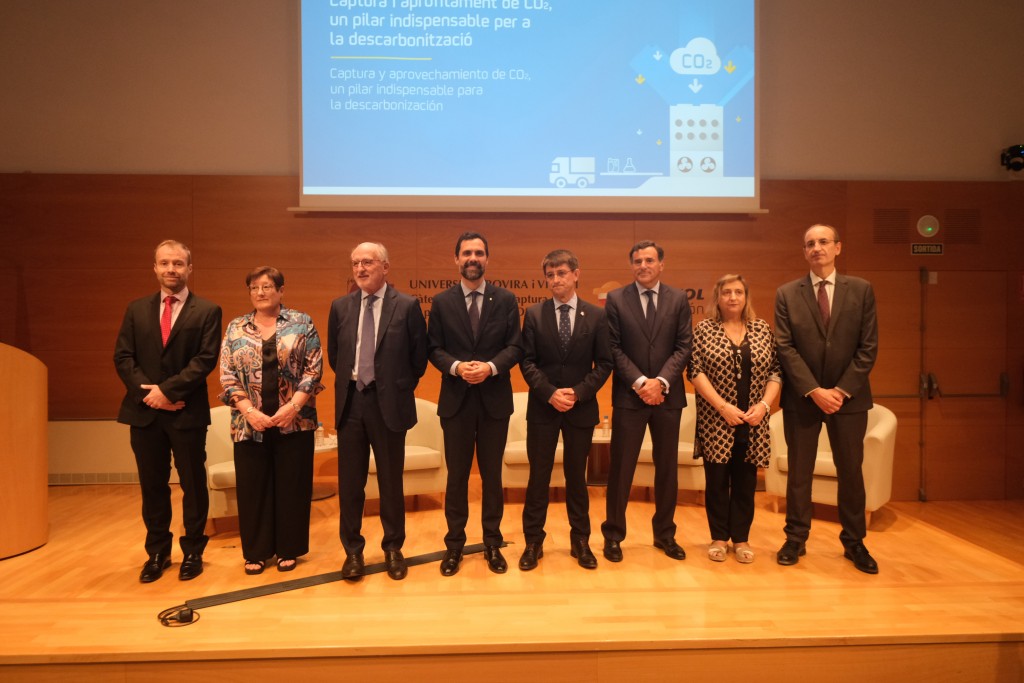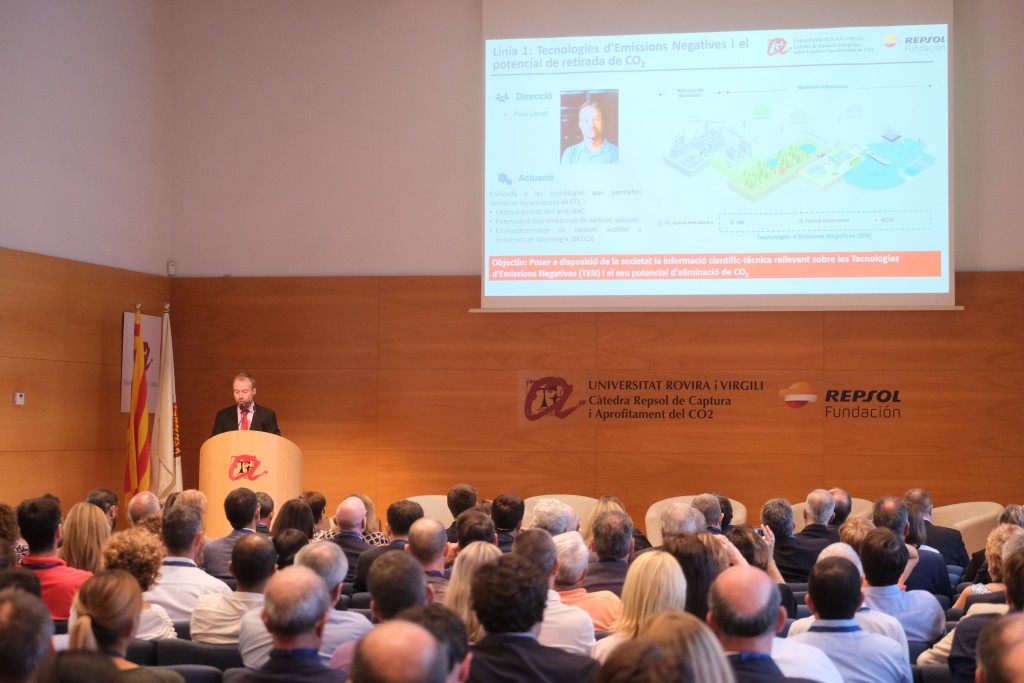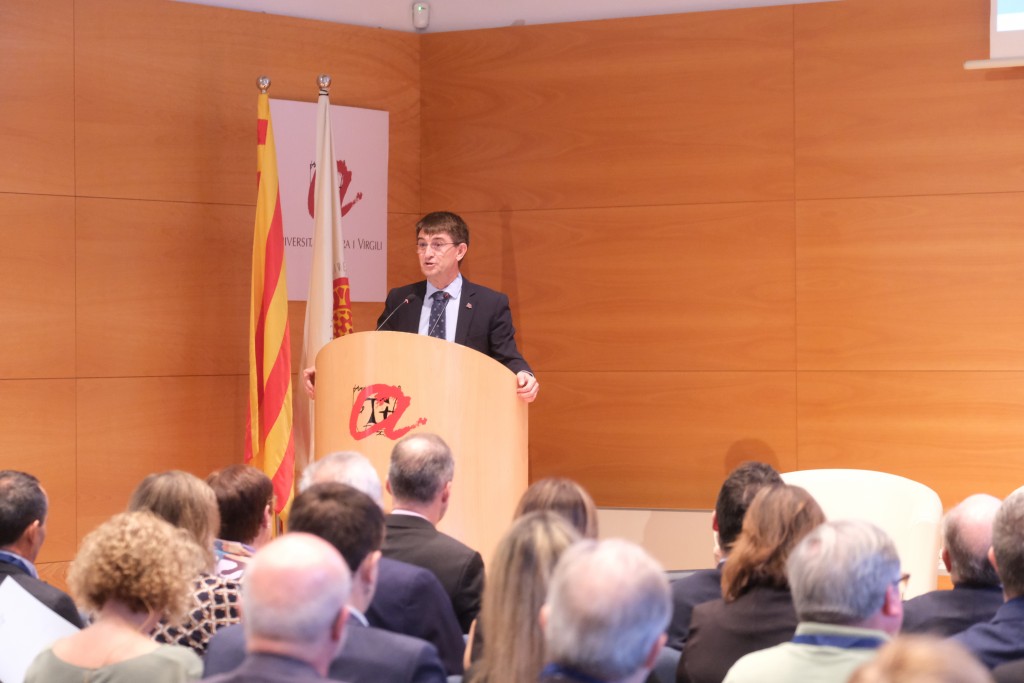06/10/2023
The URV and the Repsol Foundation create a chair in energy transition for systems of CO₂ capture and use
The aim is to help society better understand the energy transition and the technologies needed to combat climate change

The aim is to help society better understand the energy transition and the technologies needed to combat climate change
Last Friday, the Universitat Rovira i Virgili (URV) and the Repsol Foundation presented the new Energy Transition Chair on CO2 Capture and Use, which aims to inform society about the role of various negative emission technologies and the use of CO2 in a climate-neutral future.
The director of the Chair, Fèlix Llovell, said during the event that it is “imperative to act now to address the challenge of climate change, and decarbonisation is key to this strategy.” “The uniqueness of our region, which has one of the most important petrochemical complexes in Europe and also a historical and patrimonial legacy that needs to be preserved, obliges us to be pioneers and leaders on the road to energy transition,” said Llovell, who is also a lecturer in the URV’s Department of Chemical Engineering and coordinator of the Inter-University Master’s Degree in Hydrogen Technologies.
The Chair will be able to count on the services of lecturers and experts from the same university and from the group of specialised researchers at the Respol Tech Lab – the company’s innovation centre in Móstoles (Madrid) – who will investigate the role of technologies for capturing and using CO2, essential if progress is to be made towards a more sustainable and resilient society in response to climate change. In general terms, the Chair’s main areas of research will be negative emissions technologies and their potential to remove CO2 from the atmosphere, CO2 utilisation technologies and the regulatory framework that will enable these technologies to be put into practice.

Both the International Energy Agency and the Intergovernmental Panel on Climate Change have stated that CO2 capture, storage and use technologies are needed to achieve carbon neutrality. Without them, they consider it virtually impossible to achieve climate targets. They are particularly important in sectors such as the steel industry, the cement industry, and the chemical sector where electrification and other alternatives to fossil fuels are not currently viable.
Antonio Brufau, the chairman of Repsol, pointed out during his presentation that Repsol is firmly committed to reducing CO2 emissions: “We have a clear roadmap to reach climate neutrality by developing new businesses in the field of renewable energies and transforming traditional businesses. That is why we are investing in the generation of renewable energies and electricity, and we are producing renewable fuels”. According to Brufau, “CO2 reduction is an absolutely urgent and necessary objective.” “At Repsol, we are working tirelessly to achieve our goal of becoming a zero-emissions company by 2050, and we have adapted our strategy and our investments to this end. We have a clear goal and we are meeting, and will continue to meet, our intermediate objectives,” he added.
With the creation of this new Chair, the Repsol Foundation maintains its commitment to collaborate with the academic and business environment, and invest in training and knowledge as a tool to accelerate the achievement of decarbonisation objectives. As part of this strategy, the Repsol Foundation has several chairs in a network of leading universities, one of which is now the Universitat Rovira i Virgili. The Chair at the Technical University of Madrid focuses on sustainable mobility, the Chair at the University of Comillas-ICAI works on ways to sustainably decarbonise industry, the Chair at the University of the Basque Country works on the circular economy as a decarbonisation strategy and the Chair at the University of Navarre (Tecnun) focuses on the role of hydrogen as an energy vector.

Josep Pallarès, rector of the Universitat Rovira i Virgili, pointed out that the URV-Repsol Foundation Chair of Energy Transition on CO2 Capture and Use reaffirms the institution’s commitment to industrial decarbonisation. “It is not a starting point, it is the continuation of a whole series of projects, such as the promotion and coordination of the Hydrogen Valley of Catalonia, participation in the Inter-University Master’s Degree in Hydrogen Technologies and the ten research groups that work on these issues in different fields of knowledge,” explained Pallarès.
The Minister of Enterprise and Employment of the Catalan Government, Roger Torrent, also stressed that the government has set itself the goal of promoting green transformation, “a cross-cutting objective that promotes clean energy generation and the commitment to the field of green hydrogen, in the context of the Hydrogen Valley, as an alternative to the decarbonisation of heavy transport and industry.”
The Chair was presented this Friday at a conference entitled “Capture and use of CO2, the cornerstone of decarbonization,” held in the auditorium of the Rector’s Offices of the Universitat Rovira i Virgili. The event was also attended by Julio Friedman, CEO of Carbon Wrangler LLC and chief scientist of Carbon Direct, who emphasised the fundamental role that technologies for reducing and eliminating carbon from the atmosphere will play. The day ended with a round table discussion entitled “Perspectives, challenges and opportunities on the road to decarbonisation to achieve zero emissions.”
